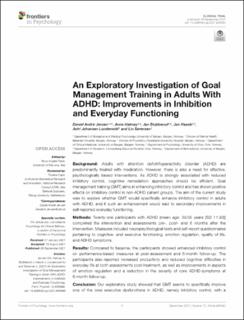| dc.contributor.author | Jensen, Daniel André | |
| dc.contributor.author | Halmøy, Anne | |
| dc.contributor.author | Stubberud, Jan Egil | |
| dc.contributor.author | Haavik, Jan | |
| dc.contributor.author | Lundervold, Astri J. | |
| dc.contributor.author | Sørensen, Lin | |
| dc.date.accessioned | 2021-11-26T12:57:19Z | |
| dc.date.available | 2021-11-26T12:57:19Z | |
| dc.date.created | 2021-10-07T13:31:13Z | |
| dc.date.issued | 2021 | |
| dc.identifier.issn | 1664-1078 | |
| dc.identifier.uri | https://hdl.handle.net/11250/2831684 | |
| dc.description.abstract | Background: Adults with attention deficit/hyperactivity disorder (ADHD) are predominantly treated with medication. However, there is also a need for effective, psychologically based interventions. As ADHD is strongly associated with reduced inhibitory control, cognitive remediation approaches should be efficient. Goal management training (GMT) aims at enhancing inhibitory control and has shown positive effects on inhibitory control in non-ADHD patient groups. The aim of the current study was to explore whether GMT would specifically enhance inhibitory control in adults with ADHD, and if such an enhancement would lead to secondary improvements in self-reported everyday functioning.
Methods: Twenty-one participants with ADHD (mean age: 39.05 years [SD 11.93]) completed the intervention and assessments pre-, post- and 6 months after the intervention. Measures included neuropsychological tests and self-report questionnaires pertaining to cognitive- and executive functioning, emotion regulation, quality of life, and ADHD symptoms.
Results: Compared to baseline, the participants showed enhanced inhibitory control on performance-based measures at post-assessment and 6-month follow-up. The participants also reported increased productivity and reduced cognitive difficulties in everyday life at both assessments post-treatment, as well as improvements in aspects of emotion regulation and a reduction in the severity of core ADHD-symptoms at 6-month follow-up.
Conclusion: Our exploratory study showed that GMT seems to specifically improve one of the core executive dysfunctions in ADHD, namely inhibitory control, with a positive effect lasting at least 6 months post-treatment. The adults with ADHD also reported improved self-regulation in their everyday life after completing GMT, providing strong arguments for further investigations of GMT as a treatment option for this group of adults. | en_US |
| dc.language.iso | eng | en_US |
| dc.publisher | Frontiers | en_US |
| dc.rights | Navngivelse 4.0 Internasjonal | * |
| dc.rights.uri | http://creativecommons.org/licenses/by/4.0/deed.no | * |
| dc.title | An Exploratory Investigation of Goal Management Training in Adults With ADHD: Improvements in Inhibition and Everyday Functioning | en_US |
| dc.type | Journal article | en_US |
| dc.type | Peer reviewed | en_US |
| dc.description.version | publishedVersion | en_US |
| dc.rights.holder | Copyright 2021 the authors | en_US |
| dc.source.articlenumber | 659480 | en_US |
| cristin.ispublished | true | |
| cristin.fulltext | original | |
| cristin.qualitycode | 1 | |
| dc.identifier.doi | 10.3389/fpsyg.2021.659480 | |
| dc.identifier.cristin | 1944140 | |
| dc.source.journal | Frontiers in Psychology | en_US |
| dc.identifier.citation | Frontiers in Psychology. 2021, 12, 659480. | en_US |
| dc.source.volume | 12 | en_US |

